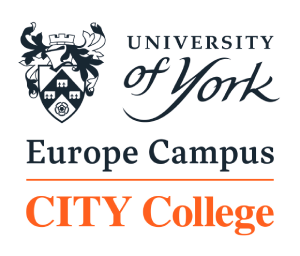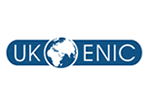News
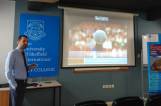
The English Studies Department gains Tips and Tricks for Improved Public Speaking
We all dread speaking in public. And in some cases, if we’re “lucky” we might actually avoid having to speak in public. What happens though, when speaking and presenting is part of a piece of coursework, or takes place in the context of a conference or is required of us in our profession? The English Studies Department sought to provide its students and the general public with even more tips and techniques through its Personal and Professional Seminar series. ELT Consultant of Express Publishing, Mr Iraklis Velissaridis, provides some vital points, tips and techniques that can prove useful in most contexts with his seminar that took place Tuesday, 26th March, titled: “Public Speaking”. Mr. Iraklis Velisaridis delivered an engaging, humorous and informative presentation on the usefulness of and the necessity of public speaking. We undertake opportunities of public speaking to communicate, persuade and/or present. As Mr. Velissaridis points out, it is necessary to always remember why we are speaking or presenting as the purpose will certainly assist in managing both the content and the mode of delivery. Public speaking contains a set of skills that can be applicable across a range of contexts such as: professional meetings, teaching/learning environments, public relations, seminars/conferences and even family gatherings. Imagine how being more public speaker savvy could enable one to give a memorable toast at a family gathering, conference dinner or even at an awards ceremony should one be called upon to do so. Speaking in public though is considered to be one of the top-most fears people have. “I’d rather die, than speak in public” is a phrase often heard. The truth is that we never get over the fear or anxiety 100% but we do find ways to manage and deal with it more effectively and successfully. Preparation is key as is rehearsing. Mr. Velissaridis advises towards knowing our audience, being capable of adapting and adjusting our style, being engaging/lively and having fun – enjoying ourselves – in the process. Mr Velissaridis provided an array of examples of public speaking, ranging from very young children – others shy, others sassy – to individuals ranging in fields and contexts such as Steve Jobs, Al Gore and Margaret Thatcher. Mr Velissaridis even included two clips of an individual to exemplify the Do’s and Don’ts: in the first instance the speaker delivered a presentation that complies with all the Don’ts while in the video that followed the speaker adopts all the Do’s resulting in a highly more engaging and successful presentation. All in all, though we strive to become competent speakers and simply get over the fear of public speaking, what we should perhaps consider instead is becoming memorable speakers. To achieve this, in addition to knowing the topic/subject, being tech-lit and tech-savvy, we also need to work on our delivery skills, voice and body language. We need to observe others who are good at presenting and we need to practice at becoming better at if through preparation, rehearsal and feedback if we want to not simply overcome the fear but more importantly become effective and memorable public speakers.
27/03/2019
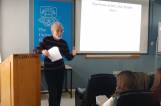
The English Studies Department Makes the Most of the Teacher’s Voice and Body Language
The English Studies Department was fortunate to host its second Personal and Professional Development Seminar on Tuesday, 19th March. Our guest speaker, Dr. Luke Prodromou, with an extensive background in drama, theatre as well as teaching (TEFL, TESOL) delivered a seminar/performance titled: Making the Most of the Teacher’s Voice and Body Language. Dr. Prodromou began his seminar by warming up the audience. With the accompaniment of reggae music he asked those attending to stand, stretch and even sing along; in other words to warm-up their voice and bodies. After that, the audience got a taste of Dr. Prodromou’s performance capabilities as he introduced himself in a variety of ways just using his voice and body language as instruments. According to Dr. Prodromou, a teacher’s voice is a vital instrument for getting and keeping students’ attention. Having a voice physically means we have to learn how to use it pedagogically. Our guest speaker drew our attention to the significance of the loudness of our voice, the variety that intonation and stress provide, the effect of pacing as well as the importance of pauses. Everything that Dr. Prodromou raised through his seminar he actually employed with his own voice and body language thus providing an educational and entertaining experience. The examples, however, do not end there. Dr. Prodromou also saw the need to initially have the audience reflect on their voice and how they use it. He called on the audience to observe and comment on other examples of voices, both audio – from an array of his own recordings – and audiovisual examples from films ranging from the golden era of Hollywood to more relatively recent ones like Dead Poets Society (1989) and Dangerous Minds (1995). Pair work and group work were not missing from this particular seminar. Challenges also included trying to successfully recite tongue-twisters, to identifying the importance and effect of pauses used by teachers in film to considering the humorous and engaging effect mimicking well-known actors/characters could even have. The final portion of the seminar focused on the importance of body language. Dr. Prodromou focused on actors portraying teachers in films and informed the audience of various studies that have been conducted examining to what extent the body language employed by these actors is actually representative of teachers or not. If anything is to be maintained from such a seminar it is that if – to quote Shakespeare – “All the world’s a stage” (As You Like It, Act II, Scene VII), then a classroom is the teacher’s stage and ought to be used to the fullest for a successful teaching/learning experience.
22/03/2019
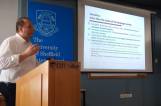
The English Studies Department Learns the Significance of Intersemiotic Translation
March 5th marks the beginning of the Spring semester series of the English Studies Department Personal and Professional Development Seminars. Our first guest speaker, Dr. Evangelos Kourdis, presented an interesting topic that extends on the field of Translation Studies. The topic in question: Intericonicity as Intersemiotic Translation in a Globalised Culture. Dr. Kourdis began his presentation with a basic theoretical overview of Semiotics as well as the matter of signs and communication. He then introduced and extended on the areas of Intersemiosis/Intertextuality, concepts that reveal networks of relations and can help in understanding Cultural Translation. According to Dr. Kourdis, the notion of text is very broad when considered from the perspective of Semiotics. Though language is the primary guide, as it can also be applied to understanding and translating non-verbal signs, other aspects that we need to consider for an Intersemiotic approach to translation are context as well as cultural memory. These can assist in multisemiotic and multimodal communication, areas where assessing the similarities and differences are important in order to effectively translate a text. Dr. Kourdis informs us that Intersemiotic translation or transmutation may occur among non-verbal sign systems and extends this by presenting cases of intersemiotic (intericonic) translatins that have artistic texts as source texts. More specifically, Dr. Kourdis drew our attention to the matter of “posing” and how certain photography recreated or translated paintings into photos. Dr. Kourdis informs that in these intersemiotic translations the source text, though absent, is always present due to world cultural memory (imagine recreating a photo or movie scene). Furthermore, the repetitiveness in the use of these old and well-known original texts, and their inscription in the collective memory (for instance, The Creation of Adam) as high cultural value texts, seems to affect the fact that they have been chosen as texts capable of being transmuted. Thus, the question of which texts are chosen and in some cases why or by whom also pose as interesting areas for research. In closing, Dr. Kourdis further argues that translation can be understood as a re-narration of cultural knowledge using different signs but on the same or similar sign space. In addition to cultural knowledge, Intersemiotic Translation can assist in areas such as: Advertising, Graphic Design, Foreign Language Teaching, publishing, working as a cultural mediator and in instances of transcreation. Evidently, the field of Semiotics can greatly contribute and enrich fields such as Linguistics, Language and Communication, Translation, Literary and Cultural Studies.
06/03/2019
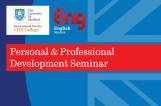
Personal & Professional Development Seminars 2019 by our English Studies Dept.
March - April - May 2019 FREE ADMISSION Join and share! Online Participation Form
01/03/2019
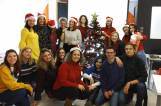
The English Studies Department Trims the Christmas Tree
The English Studies Department has officially trimmed its Christmas Tree at the Xmas event held Wednesday, 12 December. Students and staff jingled around their lessons in a festive gathering filled with laughter, games, song, and Christmas decorations. Though we did not eat figgy-pudding, we did enjoy an array of pastries, sandwiches, sweet bread, pitas, chocolate and refreshments. We also crafted glittered snowflakes, composed our traditional Syntax-tree, answered holiday related questions, drew on paper plates placed atop our heads, drew names for Christmas gifts, and snapped memorable photos. We even went so far as to create glittered Rorschach tests while others got Xmas related body art designs! It may not be a white Christmas – yet at least – but the ESD family is definitely in the holiday spirit! Happy Holidays to All!!!
17/12/2018
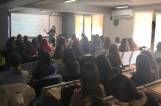
The English Studies Department Goes (Inter)cultural via Audiovisual Translation
The fourth Personal and Professional Development Seminar of the English Studies Department, held on Tuesday, 4 December, confirms the multiple applications and significance of translation in general, and audiovisual translation in particular. Guest speaker, Dr. Katerina Gouleti, an academic and professional translator and subtitler, delivered a highly informative and multi-sided seminar titled: (Inter)cultural Representations and Practices in Audiovisual Translation. In this seminar, Dr. Gouleti demonstrated the connection between audiovisual translation and the market place, academia as well as education, providing multiple, highly diverse and interactive examples to demonstrate the practices and applications of audiovisual translation. The significance of audiovisual translation can be found in economy, culture and education. Participants were made aware of different types of translation (intralingual, interlingual, intersemiotic) and were informed that the future lies in the practice of transcreation. As Dr. Gouleti informs, in an age of globalization, marketing and translation have taken a turn towards glocalization: customizing for local markets and needs. Thus the role of the subtitler, as well as translator, is becoming more visible and necessary. This can be evidenced in the law just recently passed by the European Union where broadcasters will have to provide customized audiovisual translations, to the booming demands for translators/interpreters due to immigration and the surge of refugees to the ever growing online educational programmes (MOOCs) offered by various institutions the world over. Dr. Gouleti emphasized the tight association between translation and culture, how audiovisual translation can extend to semiotic activism (citing the amongst others, the example of Podemos), how technology has assisted in the development of the field with subtitle glasses – already implemented in the context of the National Theatre of London - to software that can assist in the teaching of languages whilst also promoting active/creative learners and audiovisual literacy. Evidently, the field of Audiovisual translation is expanding, developing and promises to be a fruitful area for academic research, occupational opportunities as well as an area that can provide additional perspectives that can assist in the cultivation of cultural and educational appreciation.
11/12/2018
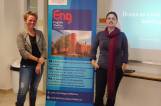
The English Studies Department Actively Learns Through Drama
The month of November would not find the English Studies Department lacking in a Personal and Professional Development Seminar. Tuesday, 13 November inaugurates the active/interactive Personal and Professional Development seminar titled: Drama as a Tool for Active Learning. Guest speaker Ms Despina Kalaitzidou - an instructor, drama facilitator, playwright and director – introduced the inspiring aspect of active learning an approach where students are actively involved in the learning process. Drama poses as an ideal technique that assists in employing this approach and Ms Kalaitzidou’s practical seminar helped raise awareness towards the significance and creativity of Drama in Education. Dr Marazi and Ms Kalaitzidou The seminar introduced or rather highlighted some strategies that are employed in teaching methodologies that are closely associated with active learning such as: brainstorming, group work, games, creative writing, role play, simulation, reflection, as well as multisensory and multimodal teaching/learning. At the same time, Ms Kalaitzidou stressed how to be an active learner one also has to be a critical thinker. Moreover, drawing on the work of Dorothy Heathcote, Ms Kalaitzidou emphasized and demonstrated how the aims of Drama in Education are to create a dramatic experience one “lives through” and via surprise and discovery actively engage senses, imagination, language and the body to solve a problem, face a challenge, consider an alternate perspective, or reach new levels of understanding. Beginning with a group breathing warm-up, participant volunteers engaged in a series of active learning activities. The first required pantomime and guess work; the second, actively joining a group to display preference, while the third required turn-taking, pantomime, questions/answers and following instructions. Before reflecting on the process, a cool-down of collective breathing helped to bring about a sense of closure. The Q/A session to follow actually turned out to be an interactive discussion where participants provided feedback on their experience, reflected on the benefits and challenges, the types of drama techniques one can employ for English Language Teaching but also in what other subject areas Drama as a Tool for Active Learning can be applied. The overall educational and inspirational benefits of Ms Kalaitzidou’s workshop are the combination of theory, action, reflection as well as the multiple perspectives from which one can see the significance of Drama: as literature, as a teaching/learning tool, and as a form of art.
15/11/2018
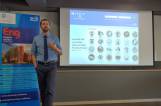
An engaging seminar on Gamification in English Language Teaching organised by the English Studies Department
Gamifying lessons, material and teachers: an inside look from Express Publishing The end of October, more specifically Tuesday, 30th October, finds the English Studies Department of the University of Sheffield International Faculty CITY College attending its second Personal and Professional Development Seminar. The focus? “Gamification and Practical Application in EFL.” Our guest speaker, Express Publishing ELT consultant Mr. Iraklis Velisaridis, delivered an engaging, humorous and informative presentation on the mentality of gamification and teaching. After contextualizing the matter with everyday examples of how gaming features and techniques engage and motivate us, our attention was turned to how they can be applied in teaching and learning. Gamification or “the concept of applying game mechanics and game design techniques to engage and motivate people/students to achieve their goals” has been and is generally on the rise. Teaching and learning can be seen in the context of competition, rewards, leveling up and providing incentives. To be effective, however, we can’t be unaware of technology; we need to become tech-savvy. Mr. Velisaridis highlighted how important it is for teachers themselves as well as their material to be engaging so as to attract students’ attention on a cognitive, emotional and social level. It is important to gamify our lives, our teaching and our classrooms, especially nowadays living in a digital era. Express Publishing has achieved this with Digibook series drawing on inspiration from games and video games. Concepts include students creating avatars, receiving points for activities accomplished, acquiring badges that indicate various skills, and finding themselves wanting to do one more piece of homework to ensure that extra point for themselves or for their team. Applicable as a teaching method to young learners and adults alike, the notion of gamification coupled with technology can truly bring new life to a class, to a lesson as well as to the material and subject matter one is teaching/learning.
01/11/2018
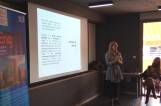
An informative Personal and Professional Development Seminar on Dyslexia organised by the English Studies Department
The first Personal and Professional Development Seminar of the English Studies Department of the University of Sheffield International Faculty CITY College to inaugurate the Autumn semester seminar series took place on Tuesday, 16 October and focused on “Teaching English to Learners with Dyslexia: from Theory to Practice.” Our distinguished speakers for the event were: Ms Viveta Lymberaki and Ms Xenia Konstantinopoulou, co-founders, owners and Directors of Studies and Special Language Disorder teachers of the English Language Centre “My Way” – the first English language centre in Northern Greece exclusively for children with Specific Learning Differences. It is truly inspiring how Ms Lymberaki and Ms Konstantinopoulou emphasize the fact that these ELT learners do not exhibit learning difficulties, but learning differences. In other words, to maximize their learning potential, educators have to become familiar with these differences and employ respective and varied teaching methodologies and techniques. Of course, such teaching would be highly enriched with a specialized background in neurolinguistics according to our speakers. In addition to raising awareness towards various misconceptions of dyslexia, Ms Konstantinopoulou and Ms Lymberaki focused on the specific case of Greek students learning English and placed emphasis on the different linguistic systems of English and Greek. Hence, attention ought to be paid to phonological awareness, creating a personal picture dictionary, and using mind maps. Multi-sensory teaching methods essentially assist students with SpLDs to adapt more smoothly to mainstream classrooms. Given that the matter of Dyslexia is still held by some as taboo, it is important to raise awareness that it does not pose as an impairment or difficulty but simply signals that students learn differently.
24/10/2018
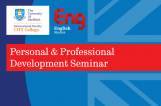
Personal & Professional Development Seminars 2018 by our English Studies Dept.
October - November - December 2018 FREE ADMISSION Online Participation Form Join and share!
15/10/2018
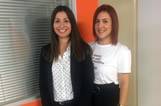
Public Engagement Scheme by our English Studies Department: Year 3!
English Language Lessons for Teenagers It is with great pleasure that the English Studies Department of the University of Sheffield International Faculty CITY College welcomes for a third consecutive academic year our newest and youngest students. Our Public Engagement Scheme for high-school students, titled "English Language Lessons for Teenagers" has already begun, full of enthusiasm, excitement and creativity. This is a programme offered to financially vulnerable families, which has been designed by Dr Paschalia Patsala, Senior Lecturer of the Department in collaboration with the Municipality of Thessaloniki, and is led by Dr Zoi Tatsioka, Head of the Department and Dr Vicky Papachristou, Lecturer of the Department. The continuous support of Express Publishing has been of pivotal importance to this project, as the company has been providing students and teachers with material, known for its top quality, well-researched and innovative nature. We are truly indebted to them for their valuable contribution. Lastly, this venture could not have been realised without the assistance offered by the volunteers of the ESD (staff members, MA students and alumni), who wholeheartedly support this programme offering their teaching insights. This year our students will be undertaking B2 level examinations, so we would all like to wish them the best of luck in their endeavour!
09/10/2018
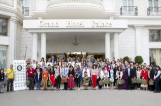
The English Studies Dept. co-organises the 5th Language in Focus International Conference in Thessaloniki
A truly multicultural and interdisciplinary event The University of Sheffield International Faculty, CITY College announces the successful completion of the 5th consecutive Language in Focus conference (LIF), which took place on 3-5 May 2018 at the Grand Palace Hotel in Thessaloniki. The event was co-organised by Çukurova University, Turkey, the English Studies Department of the University of Sheffield International Faculty, CITY College and the Southeast European Research Centre (SEERC). The Conference featured five distinguished keynote speakers, 150 presentations and workshops delivered by participants coming from 37 countries and representing 100 academic institutions, strengthening the event’s international and multicultural character. Language in Focus is an international annual conference that has gradually become a reference point for researchers working on Linguistics, Education and languages world-wide, as it has continuously offered an academically challenging environment for the exchange of ideas and research among established academics, young researchers and zealous practitioners. This year’s LIF conference hosted a variety of talks by prominent scholars and practitioners in the fields of education and language learning. The Conference opening statement was delivered by Prof. Panayiotis Ketikidis, Vice Principal of Research, Innovation & External Relations, and Chairman of the South-East European Research Centre (SEERC). Dr Luke Prodromou, Lecturer at The University of Sheffield International Faculty CITY College, delivered a very interactive plenary talk examining the notion of ‘creative idiomaticity’ and how language learners’ creativity comes into play in language learning. Dr Prodromou attempted a redefinition of the notion of fluency, which takes into account the needs and capabilities of the diverse users of English as a Lingua Franca – and the realities of the classroom. In her talk, Prof. Sylviane Granger, Professor Emerita and Invited Professor at the University of Louvain, Belgium, challenged a persistent tendency in language teaching to treat the single word as the prominent unit in language learning. The main focus of her presentation was on collocations and lexical bundles, two highly-frequent types of unit that are largely transparent and therefore tend to escape learners’ notice. Diane Larsen-Freeman, Professor of Linguistics, and a Research Scientist at the English Language Institute of Michigan (USA), shed light upon language learners as agents actively involved in the teaching-learning process. Her presentation concluded with some insightful suggestions about what teachers can do to promote learner agency so that learners and teachers can better cope with today’s challenging times. Finally, David Singleton, Emeritus Fellow of Trinity College Dublin, and Professor at the University of Pannonia Hungary, and at the State University of Applied Sciences, Konin, Poland, looked at the interplay between L1 and L2 in bi/multilingual individuals. Academic staff of our English Studies Department had a strong presence in the event, making a solid contribution to this year’s conference through their presentations. Ms. Filio Chasioti, Dr Vicky Papachristou, Dr Kelly Pasmatzi, Ms. Maria-Araxi Sachpazian, Ms. Despina Sarantidou, and Dr Zoi Tatsioka, all delivered enlightening presentations. The English Studies Department was also represented by the graduates: Evangelos Chatzipanagiotidis, Efthymia Kalaitzidou, Eva Kanonidou, Paola Marrone, and Iro Sapouna, who presented research conducted within the Department highlighting also its research-oriented profile. We would also like to thank our colleagues from the University of Sheffield who honoured us with their presence and delivered insightful presentations and workshops. More specifically, we would like to thank Richard Simpson (Director of the English Language Teaching Centre), Dr Gabriel Ozon (School of English), Dr Nigel Russell and Dr Karen Ford (Learning and Teaching Services), who travelled to Thessaloniki in order to take part in the event. In addition to the conference sessions, participants had the opportunity to experience a rich social and cultural programme, making their stay in Thessaloniki even more enjoyable. The programme included a visit at the archaeological site of Vergina, the Ancient City of Aiges (i.e. the first capital of Macedonia) as well as a city tour in Thessaloniki. Our guests were impressed by both destinations and had the change to get a flavour of the Greek cultural heritage. Overall, the event was an overwhelming success which managed to bring together academics from the four corners of the earth. Warm congratulations for their endeavours to organise this great Conference are due to the three Members of the Organising Committee: Associate Professor Cem Cam (Conference President), Dr Paschalia Patsala (Head of the English Studies Department) and Dr Zoi Tatsioka (Lecturer and Research Director of our English Studies Department). Finally, special thanks are due for their hard work to the Conference Secreteriat, the members of the Scientific Committee, the Chairs of the Conference sessions, as well as the amazing and friendly team of student-volunteers coming from the English Studies Department. We are pleased to announce that the 6th Language in Focus Conference (LIF2019) will be held in Dubrovnik, Croatia, 2-4 May 2019, also with the presence of outstanding Keynote Speakers in the areas of Linguistics and English language teaching: Prof. Guy Cook (King’s College London, UK), Prof. Susan Hunston (University of Birmingham, UK), Prof. Suzanne Romaine (University of Oxford, UK), Prof. Nina Spada (University of Toronto, Canada), and Prof. Penny Ur (Haifa University, Israel). With the successful completion of LIF2018, a solid collaboration has been established between the International Faculty of the University of Sheffield and Çukurova University, setting the ground for a long-standing and fruitful future collaboration. Photos To view more photos from the event please see the link below: Language in Focus 2018 photo gallery
18/06/2018
  6 from 13 6 from 13   |
